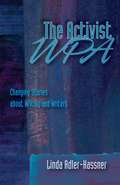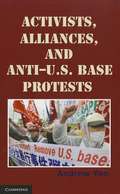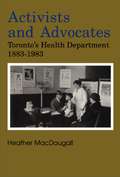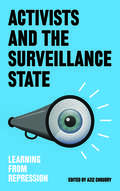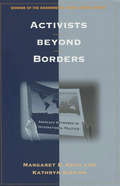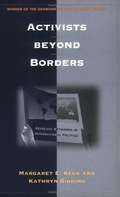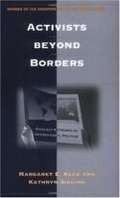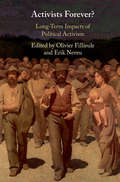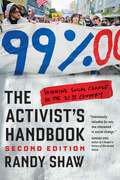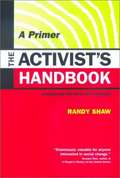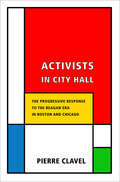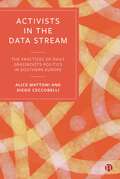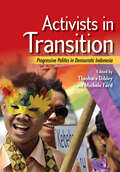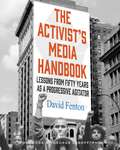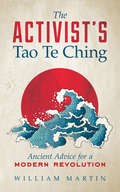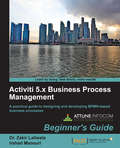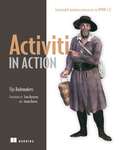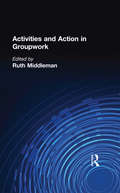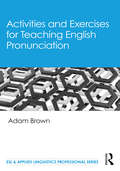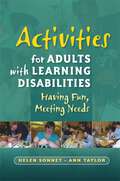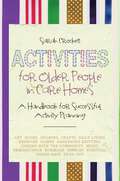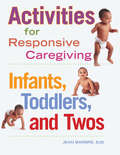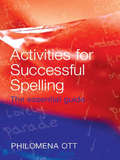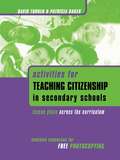- Table View
- List View
Activist WPA, The: Changing Stories About Writing and Writers
by Linda Adler-KassnerOne wonders if there is any academic field that doesn’t suffer from the way it is portrayed by the media, by politicians, by pundits and other publics. How well scholars in a discipline articulate their own definition can influence not only issues of image but the very success of the discipline in serving students and its other constituencies. The Activist WPA is an effort to address this range of issues for the field of English composition in the age of the Spellings Commission and the No Child Left Behind Act. Drawing on recent developments in framing theory and the resurgent traditions of progressive organizers, Linda Adler-Kassner calls upon composition teachers and administrators to develop strategic programs of collective action that do justice to composition’s best principles. Adler-Kassner argues that the “story” of college composition can be changed only when writing scholars bring the wonders down, to articulate a theory framework that is pragmatic and intelligible to those outside the field--and then create messages that reference that framework. In The Activist WPA, she makes a case for developing a more integrated vision of outreach, English education, and writing program administration.
Activists, Alliances, and Anti-U.S. Base Protests
by Andrew YeoAnti-U.S. base protests, played out in parliaments and the streets of host nations, continue to arise in different parts of the world. In a novel approach, this book examines the impact of anti-base movements and the important role bilateral alliance relationships play in shaping movement outcomes. The author explains not only when and how anti-base movements matter, but also how host governments balance between domestic and international pressure on base-related issues. Drawing on interviews with activists, politicians, policy makers and U.S. base officials in the Philippines, Japan (Okinawa), Ecuador, Italy and South Korea, the author finds that the security and foreign policy ideas held by host government elites act as a political opportunity or barrier for anti-base movements, influencing their ability to challenge overseas U.S. basing policies.
Activists and Advocates: Toronto's Health Department 1883-1983
by Heather MacdougallFor more than a century, Toronto’s Health Department has served as a model of evolving municipal public health services in Canada and beyond. From horse manure to hippies and small pox to AIDS, the Department’s staff have established and maintained standards of environmental cleanliness and communicable disease control procedures that have made the city a healthy place to live. This centennial history anlyzes the complex interaction of politics, patronage and professional aspirations which determine the success or failure of specific policies and programs. As such, it fills a long neglected gap in our understanding of the development of local health services. Using Toronto’s changing circumstances as a backdrop, the book details the evolution of the international public health movement through its various phases culminating in the modern emphasis on health promotion and health advocacy. By so doing, it demonstrates the significant contribution of preventive medicine and public health activities to Canadian life
Activists and the Surveillance State: Learning from Repression
by Aziz ChoudryThe use of secret police, security agencies and informers to spy on, disrupt and undermine opposition to the dominant political and economic order has a long history. This book reflects on the surveillance, harassment and infiltration that pervades the lives of activists, organizations and movements that are labelled as ‘threats to national security’. Activists and scholars from the UK, South Africa, Canada, the US, Australia and Aotearoa/New Zealand expose disturbing stories of political policing to question what lies beneath state surveillance. Problematizing the social amnesia that exists within progressive political networks and supposed liberal democracies, Activists and the Surveillance State shows that ultimately, movements can learn from their own repression, developing a critical and complex understanding of the nature of states, capital and democracy today that can inform the struggles of tomorrow.
Activists beyond Borders: Advocacy Networks in International Politics
by Margaret E. Keck Kathryn SikkinkIn Activists beyond Borders, Margaret E. Keck and Kathryn Sikkink examine a type of pressure group that has been largely ignored by political analysts: networks of activists that coalesce and operate across national frontiers. Their targets may be international organizations or the policies of particular states. Historical examples of such transborder alliances include anti-slavery and woman suffrage campaigns. In the past two decades, transnational activism has had a significant impact in human rights, especially in Latin America, and advocacy networks have strongly influenced environmental politics as well. The authors also examine the emergence of an international campaign around violence against women.
Activists Beyond Borders: Advocacy Networks in International Politics
by Margaret E. Keck Kathryn SikkinkSurvey of non-governmental organizations' role in pressing for improvements in areas such as human rights, environmental stewardship and more.
Activists beyond Borders
by Margaret E. Keck Kathryn SikkinkA masterful combination of emerging theory and empirical comparison of one of the most intriguing areas of transnational politics. Keck and Sikkink access a broad range of theory from social movements, international relations, and comparative politics research to glean from a wealth of their own research findings solid and thought-provoking conclusions about the most interesting and least well-understood area of contentious politics in the world today. -Sidney Tarrow, Cornell University (Government) "Activists beyond Borders is a searching exploration of advocacy networks, providing compelling accounts in areas such as human rights and environmental protection and an intriguing glimpse into the transnational politics of the twenty-first century. "-Robert O. Keohane, Duke University Margaret E. Keck and Kathryn Sikkink examine a type of pressure group that has been largely ignored by political analysts: networks of activists that coalesce and operate across national frontiers. Their targets may be international organizations or the policies of particular states. Historical examples of such transborder alliances include anti-slavery and woman suffrage campaigns. In the past two decades, transnational activism has had a significant impact in human rights, especially in Latin America, and advocacy networks have strongly influenced environmental politics as well. The authors also examine the emergence of an international campaign around violence against women.
Activists Forever?: Long-Term Impacts of Political Activism (Cambridge Studies in Contentious Politics)
by Olivier Fillieule Erik NeveuActivists Forever? explores the consequences of political involvement on an individual's life. While much of the research in this area has focused on the motivations of entire protests groups, the editors of this volume propose an approach that focuses on actors. This book examines political involvement's socio-biographical effects, or the ways in which political commitment generates or modifies dispositions to act, think, and perceive, in a way that is either consistent with or in contrast to the results of previous socialization. The contents explore what political involvement leads to rather than what causes involvement. Using a variety of case studies, this collection of essays provides global coverage with a focus on participation in major protests in the 1960s and significantly broadens our understanding by looking outside the United States. These essays look at the lasting effects of activists' knowledge, connections, and symbolic capital on their future participation in politics, as well as their personal and professional lives.
The Activist's Handbook
by Randy ShawIn this thoroughly revised and updated edition of The Activist's Handbook, Randy Shaw's hard-hitting guide to winning social change, the author brings the strategic and tactical guidance of the prior edition into the age of Obama. Shaw details how activists can best use the Internet and social media, and analyzes the strategic strengths and weaknesses of rising 21st century movements for immigrant rights, marriage equality, and against climate change. Shaw also highlights increased student activism towards fostering greater social justice in the 21st century. The Activist's Handbook: Winning Social Change in the 21st Century details the impact of specific strategies on campaigns across the country, from Occupy Wall Street to battles over sweatshops, the environment, AIDS policies, education reform, homelessness, and more: How should activists use new media tools to expose issues and mobilize grassroots support? When should activists form coalitions, and with whom? How are students--be they DREAMers seeking immigration reform or college activists battling ever-increasing tuition costs--winning major campaigns? Whether it's by inspiring "fear and loathing" in politicians, building diverse coalitions, using ballot initiatives, or harnessing the media, the courts, and the electoral process towards social change, Shaw--a longtime activist for urban issues--shows that with a plan, positive change can be achieved. In showing how people can win social change struggles against even overwhelming odds, The Activist's Handbook is an indispensable guide not only for activists, but for anyone interested in the future of progressive politics in America.
The Activist's Handbook: A Primer (Updated edition)
by Randy ShawStrategies on how to win grass roots campaigns by developing proactive agendas and making sound decisions, with many examples of successful campaigns. As campaigns increasingly require building coalitions among diverse, multi-issue constituencies, the skill of ensuring good process both internally and externally is even more vital.
Activists In City Hall
by Pierre ClavelIn 1983, Boston and Chicago elected progressive mayors with deep roots among community activists. Taking office as the Reagan administration was withdrawing federal aid from local governments, Boston's Raymond Flynn and Chicago's Harold Washington implemented major policies that would outlast them. More than reforming governments, they changed the substance of what the government was trying to do: above all, to effect a measure of redistribution of resources to the cities' poor and working classes and away from hollow goals of "growth" as measured by the accumulation of skyscrapers. In Boston, Flynn moderated an office development boom while securing millions of dollars for affordable housing. In Chicago, Washington implemented concrete measures to save manufacturing jobs, against the tide of national policy and trends. Activists in City Hall examines how both mayors achieved their objectives by incorporating neighborhood activists as a new organizational force in devising, debating, implementing, and shaping policy. Based in extensive archival research enriched by details and insights gleaned from hours of interviews with key figures in each administration and each city's activist community, Pierre Clavel argues that key to the success of each mayor were numerous factors: productive contacts between city hall and neighborhood activists, strong social bases for their agendas, administrative innovations, and alternative visions of the city. Comparing the experiences of Boston and Chicago with those of other contemporary progressive cities-Hartford, Berkeley, Madison, Santa Cruz, Santa Monica, Burlington, and San Francisco-Activists in City Hall provides a new account of progressive urban politics during the Reagan era and offers many valuable lessons for policymakers, city planners, and progressive political activists.
Activists in the Data Stream: The Practices of Daily Grassroots Politics in Southern Europe
by Alice Mattoni Diego CeccobelliAvailable Open Access digitally under CC-BY-ND licence This book pulls back the curtain on the link between activism, media and technology in the quiet times of politics when people are not protesting. Introducing the novel concept of the ‘data stream', it explores the intricate ways in which activists interact daily with various types of data and how they navigate the impact of digitalization and datafication on today’s grassroots politics. Through rich, empirical data from Greece, Spain and Italy, Activists in the Data Stream makes a nuanced contribution to our understanding of activists’ daily political engagement in an ever-changing media and political landscape.
Activists in Transition: Progressive Politics in Democratic Indonesia
Activists in Transition examines the relationship between social movements and democratization in Indonesia. Collectively, progressive social movements have played a critical role over in ensuring that different groups of citizens can engage directly in—and benefit from—the political process in a way that was not possible under authoritarianism. However, their individual roles have been different, with some playing a decisive role in the destabilization of the regime and others serving as bell-weathers of the advancement, or otherwise, of Indonesia's democracy in the decades since. Equally important, democratization has affected social movements differently depending on the form taken by each movement during the New Order period. The book assesses the contribution that nine progressive social movements have made to the democratization of Indonesia since the late 1980s, and how, in turn, each of those movements has been influenced by democratization.
The Activist's Media Handbook
by David FentonA Simon & Schuster eBook. Simon & Schuster has a great book for every reader.
The Activist's Tao Te Ching: Ancient Advice for a Modern Revolution
by William MartinChange and anger are in the air. "We are the 99%," "black lives matter," and "love is love" have become part of the lexicon. Previously unquestioned institutions (police, military, the NSA) are under scrutiny. Heat waves, floods, and earthquakes seem to be increasing. Could there be a silver lining? William Martin turns to the Tao Te Ching and finds that while Taoism is known for its quiet, enigmatic wisdom, the Tao can also have the cleansing force of a rushing river. Martin elucidates these revolutionary messages condemning power seeking and greed. He emphasizes that humans have a "Te" that can help them heal the planet; shows how Taoism's "simplicity" can be subversive and its flexibility a potent force; and reassures us that "When injustice is the rule, justice lies in wait." Provocative and stirring, Martin's Tao flows within and through those who ride the waves of anger and frustration, "and gently guides [them] to true freedom."
Activiti 5.x Business Process Management Beginner's Guide
by Dr Zakir Laliwala Irshad MansuriBeing a Packt Beginner's Guide, each chapter follows an easy to understand approach with plenty of screenshots and clear and concise steps to guide you throughout. This book is primarily intended for Business Analysts (BAs) who need to develop a process model for implementation in a Business Process Management system. The book assumes that you have basic knowledge of business analysis; however, no Activiti or Java knowledge is required.
Activiti in Action: Executable business processes in BPMN 2.0
by Tijs RademakersSummary Activiti in Action is a comprehensive tutorial designed to introduce developers to the world of business process modeling using Activiti. Before diving into the nuts and bolts of Activiti, this book presents a solid introduction to BPMN 2.0 from a developer's perspective. About the Technology Activiti streamlines the implemention of your business processes: with Activiti Designer you draw your business process using BPMN. Its XML output goes to the Activiti Engine which then creates the web forms and performs the communications that implement your process. It's as simple as that. Activiti is lightweight, integrates seamlessly with standard frameworks, and includes easy-to-use design and management tools. About the Book Activiti in Action introduces developers to business process modeling with Activiti. You'll start by exploring BPMN 2.0 from a developer's perspective. Then, you'll quickly move to examples that show you how to implement processes with Activiti. You'll dive into key areas of process modeling, including workflow, ESB usage, process monitoring, event handling, business rule engines, and document management integration. Written for business application developers. Familiarity with Java and BPMN is helpful but not required. Purchase of the print book comes with an offer of a free PDF, ePub, and Kindle eBook from Manning. Also available is all code from the book. What's Inside Activiti from the ground up Dozens of real-world examples Integrate with standard Java tooling Table of Contents PART 1 INTRODUCING BPMN 2.0 AND ACTIVITI Introducing the Activiti framework BPMN 2.0: what's in it for developers? Introducing the Activiti tool stack Working with the Activiti process engine PART 2 IMPLEMENTING BPMN 2.0 PROCESSES WITH ACTIVITI Implementing a BPMN 2.0 process Applying advanced BPMN 2.0 and extensions Dealing with error handling Deploying and configuring the Activiti Engine Exploring additional Activiti modules PART 3 ENHANCING BPMN 2.0 PROCESSES Implementing advanced workflow Integrating services with a BPMN 2.0 process Ruling the business rule engine Document management using Alfresco Business monitoring and Activiti PART 4 MANAGING BPMN 2.0 PROCESSES? Managing the Activiti Engine
Activities and Action in Groupwork
by Ruth MiddlemanThis helpful and practical book examines the uses of innovative activities in social groupwork with a number of different populations, such as adolescents, school-age parents and their children, the elderly, and Hispanics.
Activities and Exercises for Teaching English Pronunciation
by Adam BrownThis book is a practical, comprehensive tool for busy teachers or educators teaching English pronunciation. Brown puts pronunciation into perspective with other aspects of language, highlighting the importance of teaching pronunciation from the start. Applicable for both British and American pronunciation, this book is organized by aspects of pronunciation and includes a wealth of photocopiable worksheets to use in the classroom. The engaging exercises include rhymes, games, puzzles, narratives, and more, all designed to promote learner engagement and understanding. Each worksheet is accompanied by supplementary resources and guidance, including recommendations for modifying lessons for different English learner proficiency levels; instructions for the teacher and learners; correct or expected answers; and tips for teachers to extend and create their own exercises. The versatility and adaptability of this book make it a beneficial resource for teachers of ESL/EFL/EAL, as well as educational professionals who consult and oversee teacher trainer programs and courses in TESOL.
Activities for Adults with Learning Disabilities: Having Fun, Meeting Needs
by Ann Taylor Helen SonnetThis valuable resource for people working with adults with learning disabilities provides over 60 sessions of fun and engaging activities that aim to entertain and stimulate the minds of people with learning disabilities. The sessions are divided into different types of activity including cookery, arts and crafts, drama and dance, and outside events. A comprehensive collection of varied and enjoyable activities, this practical book also contains useful tips to ensure that sessions run smoothly. All the activities are tried and tested by experienced practitioners and include a key advising the level of help required, wheelchair user suitability and any related health and safety issues involved. Ideal for use in social clubs or residential homes, this is an essential resource for professionals and volunteers working with adults with learning disabilities.
Activities for Older People in Care Homes: A Handbook for Successful Activity Planning
by Sarah CrockettWhen tasked with providing activities for older people in care homes, it can be difficult to know where to begin. What constitutes an activity? How can you make sure activities are as positive and person-centred as possible? What can you actually do? Written by an experienced activity coordinator, this handbook is an indispensable companion for others in this role. The author provides useful background information on dementia, the importance of activities and how to get to know residents through life story work. She addresses important practical considerations such as how to assess a resident for suitable activities, activity planning, timetabling, budgeting and money-stretching, as well as more subtle issues such as how to enthuse residents and staff to join in and how to deal with resistance from colleagues. An A-Z of inventive ideas and step-by-step instructions for activities as wide-ranging as arts and crafts, cooking, exercise, gardening, meditation, music, reminiscence, themed days and trips out is also included. Offering peer-to-peer advice and encouragement as well as a wealth of practical ideas and suggestions, this is essential reading for all those involved in activity planning for older people, including those with dementia, in care homes.
Activities for Responsive Caregiving
by Jean BarbreThe first three years set the stage for a lifetime of learning. This book provides more than eighty activities and experiences to optimize very young children's intellectual, social, emotional, and physical development, as well as strategies that support responsive caregiving.Jean Barbre, EdD, has thirty years of experience working with children and families as a preschool director, teacher, therapist, college instructor, national and international presenter, and guest presenter on public television.
Activities for Successful Spelling: The Essential Guide
by Philomena OttThis highly practical activity workbook is linked to the core text How to Manage Spelling Successfully and has been designed to support dyslexic students practise the spelling strategies and methods recommended in that book. This activity book can be used separately, or as part of an integrated programme for building students' spelling skills at home or at school. Suitable for mainstream classrooms, pupils undertaking additional literacy support in small groups, and for one-to-one teaching of individuals with specific learning difficulties including dyslexia, this excellent resource contains activities suitable for use at different stages of development, and for use with adults as well as school students. Each section contains a range of multi-sensory activities, including word searches, simple crossword puzzles and dictation exercises. This is an essential classroom companion for anyone helping struggling spellers.
Activities for Teaching Citizenship in Secondary Schools: Lesson Plans Across the Curriculum
by Baker, Patricia Turner, DavidA resource for teachers wishing to develop citizenship in their teaching activities. It provides activities for use in teaching, and includes lesson plans, photocopiable work sheets and guides to further resources.
Activities for Using the Internet in Primary Schools
by De Cicco, Eta Farmer, Mike (Senior Lecturer, University of Central England) Hargrave, ClaireThis text guides primary staff to Internet sites of value to the national curriculum Key Stages 1 and 2 offering appropriate ways of using ICT in the classroom. It contains practical activities, information and advice on developing and supporting class activities.
